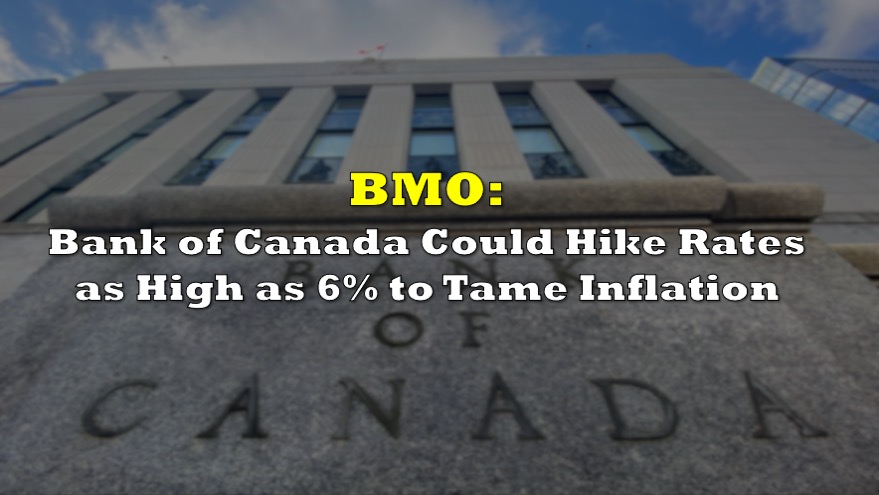The Bank of Montreal (TSX: BMO) reported disappointing third-quarter results on Tuesday, falling short of analyst expectations for the sixth consecutive quarter. The Toronto-based bank’s financial performance continues to be weighed down by significantly increased provisions for credit losses, particularly in its U.S. operations, as the economic environment remains challenging.
For the fiscal third quarter ending July 31, 2024, BMO reported an adjusted net income of $1.98 billion, or $2.64 per share, missing the $2.76 per share consensus estimate. While this represents a slight improvement from the $1.87 billion ($2.48 per share) reported in the same quarter last year, it fell short of expectations primarily due to a substantial rise in provisions for credit losses.
BMO’s total revenue for the quarter reached $8.19 billion, marking a modest increase from the $8.05 billion recorded in the same period last year.
Net interest income came in at $4.79 billion, down 2.3% from $4.90 billion a year earlier. Non-interest revenue, however, saw an 8% increase, rising to $3.4 billion from $3.15 billion in the third quarter of 2023.
A significant driver of BMO’s earnings miss was the sharp increase in provisions for credit losses, which surged to $906 million from $492 million in the third quarter of 2023—an 84% increase year-over-year. This figure also far exceeded the $745 million analysts had anticipated for the quarter, highlighting growing concerns about the credit quality of BMO’s loan portfolio, particularly in its U.S. operations.
The majority of the provision for credit losses increase was attributed to impaired loans, which rose to $828 million, up from $333 million a year earlier. The provision for credit losses on performing loans, however, decreased to $78 million from $159 million in the same period last year. This increase in impaired loans suggests that more borrowers are struggling to meet their debt obligations as interest rates remain high and economic conditions tighten.
Following the earnings announcement, BMO’s shares dropped 5.5% to $113.61 on the Toronto Stock Exchange, extending the bank’s year-to-date loss to approximately 13%. This decline contrasts sharply with the broader market, where the S&P 500 has gained nearly 18% since the beginning of the year.
BMO’s U.S. operations have been particularly hard hit, largely due to the acquisition of San Francisco-based Bank of the West in early 2023. While this acquisition was initially seen as a strategic move to expand BMO’s footprint in the U.S. market, it has also increased the bank’s exposure to potential credit losses in a region where consumers and businesses are increasingly struggling.
In the U.S., BMO’s personal and commercial banking unit reported a 7% decline in adjusted net income to $539 million, down from $579 million in the third quarter of 2023. On a U.S. dollar basis, the adjusted net income fell even further, by 9%, to $395 million. This decline was primarily driven by higher credit loss provisions and a decrease in non-interest revenue, which could not be offset by cost reductions.
In contrast to its U.S. operations, BMO’s Canadian personal and commercial banking segment demonstrated resilience. The division reported a 4% year-over-year increase in adjusted net income to $920 million, up from $887 million in the third quarter of 2023. This growth was primarily driven by higher net interest income, which benefited from both balance growth and improved margins.
Revenue for the Canadian P&C segment rose by 7% to $3.03 billion, compared to $2.83 billion in the same quarter last year.
BMO’s capital markets operations were a bright spot in an otherwise challenging quarter. The bank’s capital markets division posted a 31% increase in adjusted net income to $394 million, up from $301 million in the third quarter of 2023.
However, BMO’s wealth management division faced difficulties, with adjusted net income falling 8% to $364 million, down from $397 million a year earlier. The decline was partly due to lower net interest income and the impacts of market volatility on client assets, although these were somewhat offset by growth in asset management revenue.
Despite the disappointing earnings, BMO CEO Darryl White struck an optimistic tone regarding the bank’s long-term strategy.
“While the cyclical increase in credit costs has resulted in loan loss provisions above our historical range, performance has been supported by operating momentum across our diversified businesses,” White said in a statement.
He emphasized the bank’s strong balance sheet and capital position, noting that BMO’s Common Equity Tier 1 (CET1) ratio remains robust at 13.0%, down slightly from 13.1% in the previous quarter but still well above the regulatory minimum of 11.5%.
White also highlighted BMO’s continued focus on cost discipline and strategic investments, particularly in areas that align with the bank’s long-term growth objectives.
“With our strategic goals firmly in place, a strong balance sheet, robust capital and liquidity, we are well-positioned to deliver sustainable returns to our shareholders,” he added.
Information for this briefing was found via Sedar, The Washington Post, Market Watch, Yahoo Finance, Bloomberg, and the sources mentioned. The author has no securities or affiliations related to this organization. Not a recommendation to buy or sell. Always do additional research and consult a professional before purchasing a security. The author holds no licenses.









